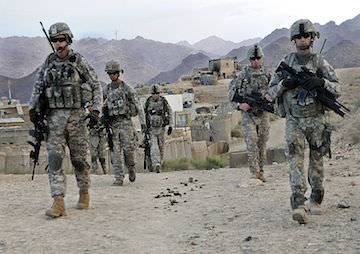The Pentagon Spent $43 Million on a Project That Should Have Cost $300,000
The Department of Defense claims it is unable to provide an explanation for the high cost of the project -- a compressed natural gas station in Afghanistan -- according to a special inspector general's report released Monday. Wikimedia
Wikimedia
The Pentagon spent an astounding $43 million on a compressed natural gas station in Afghanistan that reportedly should have cost about $300,000, according to a special inspector general’s report released Monday.
“One of the most troubling aspects of this project is that the Department of Defense claims that it is unable to provide an explanation for the high cost of the project or to answer any other questions concerning its planning, implementation, or outcome,” John Sopko, special inspector general for Afghanistan reconstruction (SIGAR), wrote in an accompanying letter to Defense Secretary Ash Carter.
The station was built in Sheberghan, Afghanistan, and was intended to show Afghan citizens the viability of natural gas, the report explains. The project, known as the Downstream Gas Utilization, was part of the Task Force for Business & Stability Operations (TFBSO).
From The Hill:
The original contract for the station was for $3 million, according to the report.
But between 2011 and 2014, the task force spent $42.7 million on the project, $30 million of which was for overhead costs, according to the report.
SIGAR found a similar natural gas station in Pakistan cost $500,000, which would equal $306,000 at the current exchange rate.
“In short, at $43 million, the TFBSO filling station cost 140 times as much as a CNG station in Pakistan,” the report says.
The task force ended in March. Because of that, the Pentagon told the special inspector general it no longer had the personnel or documentation to answer why the cost ballooned, according to the report.
The Pentagon did not dispute any facts or findings in a draft of the report, according to the comments page of the report.
In a letter responding to the findings attached to the report, Principal Deputy Under Secretary of Defense for Policy Brian P. McKeon reiterated that the closure of the task force meant certain questions couldn’t be answered. He added SIGAR didn’t take up his office’s offer of help to find documents and people who might have information, which the report disputes.
In response to the report, Sen. Claire McCaskill (D-Mo.) wrote a letter Monday to Carter asking for answers on the task force and station.
“There are few things in this job that literally make my jaw drop,” McCaskill said in a press release announcing her letter.
“But of all the examples of wasteful projects in Iraq and Afghanistan that the Pentagon began prior to our wartime contracting reforms, this genuinely shocked me. It’s hard to imagine a more outrageous waste of money than building an alternative fuel station in a war-torn country that costs 8,000 percent more than it should and is too dangerous for a watchdog to verify whether it is even operational.”
McCaskill asked Carter for the name and title of the person or office now responsible for projects started by the task force; any feasibility study done for the natural gas station project; any audit, reviews or assessments of the task; and the names of anyone still at the Pentagon who supervised the task force.
Click here for the full article.
–Posted by Roisin Davis
Your support matters…Independent journalism is under threat and overshadowed by heavily funded mainstream media.
You can help level the playing field. Become a member.
Your tax-deductible contribution keeps us digging beneath the headlines to give you thought-provoking, investigative reporting and analysis that unearths what's really happening- without compromise.
Give today to support our courageous, independent journalists.






You need to be a supporter to comment.
There are currently no responses to this article.
Be the first to respond.